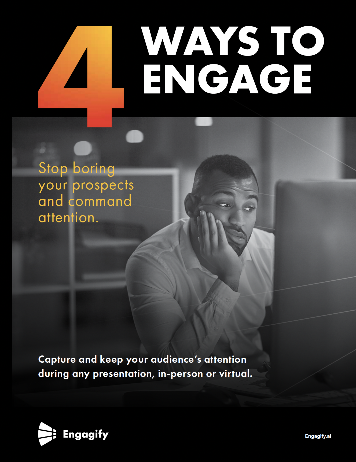Have you ever seen an amazing performance by an actor, where you know it’s a scripted play, but something about it moved you, made you feel you were eavesdropping on his real life, that he was making it all up as he went along?
That’s the sign of a great actor, when he can appear to be “in the moment,” giving you the “illusion of the first time.”
Did you know that this is also the sign of a great salesperson? Whether you’re a person making a presentation, a hotel staff member answering commonly asked questions, or a salesperson greeting and dealing with prospects in a trade show booth—they’re in the moment!
Anyone who does an exceptionally good job in dealing with the public, and having to handle similar situations over and over again, there’s a common trait that makes them great at their job.
So what’s their secret? And, what exactly do we mean by the “illusion of the first time?”
For those of you without a performance background, let me shed some light on this concept. The “illusion of the first time” is the idea of delivering a rehearsed performance in a fresh and new way.
The phrase was first coined back in 1913 by an American actor named William Gillette (Fun Fact: Gillette was one of the first actors to play Sherlock Holmes on stage. Appearing with Gillette in the role of a messenger was a very young Charlie Chaplin, who, as The Little Tramp, grew up to be the world’s first international movie star—proof of Chaplin’s own ability to engage!) In Gillette’s speech, “The Illusion of the First Time in Acting,” he conveyed the importance of an actor searching for and finding the words to express a character’s thoughts, even though these words are predetermined in the script. He sums it up beautifully by saying that the goal of the performer is to make the audience “feel that it is witnessing, not one of a thousand weary repetitions, but a life episode that is being lived just across the magic barrier of the footlights.”
Of course, this is easier said than done. As you rehearse and perfect your material (in this case a sales pitch), certain habits can be created. The problem with becoming familiar with the material is it can change the relationship between the material and the performer.
In fact, your becoming knowledgeable, or “good at” your subject, could even lose you your customers!
…Wait, what? How is that possible?
Isn’t the whole point of salesmanship to become knowledgeable and confident, and therefore more engaging and successful? Aren’t we contradicting ourselves here?
Hold on.
Here’s what we mean: After a long day of repetitive interactions, it’s very easy to become short with your booth visitors. You may be sick and tired of hearing yourself answer certain questions, but remember, it’s the first time this particular person has asked it. Sure, it may be your third trade show this month, and, okay, maybe this whole exhibiting thing is growing tiresome…
…But, it’s not about you.
Making sales is—always—about your audience. Your visitors. This is why you’re at a trade show, to make connections with potential clients and start some valuable conversations. It’s all about the audience’s experience.
So, if you alienate your audience by “going on autopilot,” or “phoning in” your performance, or by letting the booth visitor know that you say the exact same thing to everyone, well, you destroy any rapport that was being built.
Remind your booth staff that no matter how tired they are, it’s all about the booth visitor’s experience.
The visitor’s perception of you, the company, and the booth is all that matters. As the events manager or booth captain, it’s up to you to set a good example for the staff and monitor how you deal with each and every interaction.
Be present, and in the moment, to create the best results and a performance your visitors will remember.
For more ways to Engagify, check out our courses.




